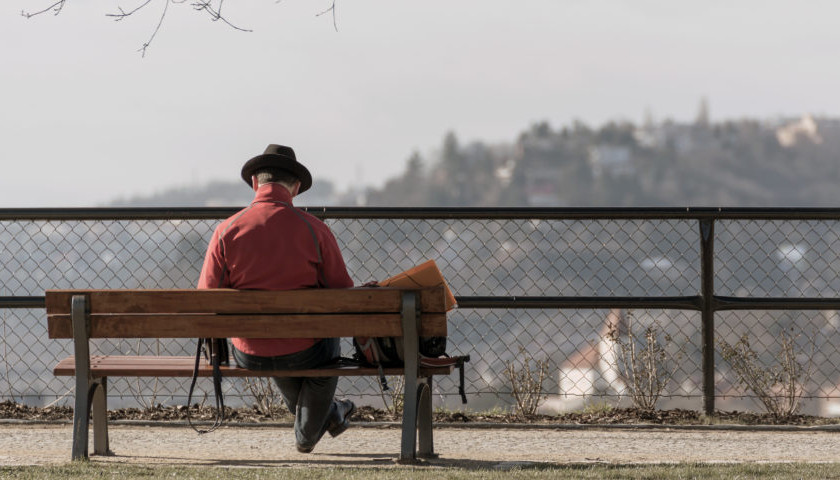by Jeff Minick
As I read through a recent Pew Research Center report detailing America’s dreary numbers regarding single-parent households, I came to a section on aging and living alone. Because I am doing both – collecting Social Security and living by myself in a place where I have few friends or family – I read this section with great interest. Pew Research reports that:
Older adults in the U.S. are more likely than those around the world to age alone: More than a quarter of Americans ages 60 and older live alone (27%), compared with a global average of 16%. There are only 14 countries with higher shares of older adults living alone, and all are in Europe. …
The most common arrangement for older U.S. adults, however, is to live as a couple without children or relatives. Almost half of U.S. adults ages 60 and older live in such households (46%), compared with a global average of 31%. Conversely, older U.S. adults are much less likely to live with a wider circle of relatives. Just 6% of older U.S. adults live in extended-family households, compared with 38% of adults ages 60 and older globally.
For the last five months, I have lived alone in a mostly empty five-bedroom house, my daughter and her family having moved to Scranton, where her husband found his dream job. As a result, I spend most of my days in silence worthy of a monastery. I find myself talking to myself more than ever before in my life.
I do go to town once a day, usually to the coffee shop, where the baristas and some of the customers know my name. If I feel the need to talk, I call my children and friends. Sometimes life in this house gets lonely, but my writing requires large swatches of solitude, and I am blessed with a mental constitution that handles solitude reasonably well.
The same is not true of all people my age.
Various studies have shown that many seniors who live alone suffer higher rates of depression, obesity, anxiety, cognitive decline, and other disorders compared to those with closer ties to friends and family. Some research indicates that loneliness also increases the risk of an early death.
So what can we do to help those who live alone – our mother in an assisted-living facility, our grandfather in the next town, that neighbor we pass in the hallway of our apartment building?
Here are five easy actions to help the elderly feel more engaged with the world around them.
1. Pick Up The Phone.
A brother-in-law of mine calls his 90-year-old father every Sunday afternoon and speaks with him at length. His father becomes confused sometimes, and often repeats himself, but Tom doesn’t mind. It’s not the reason for his calls. He’s there for his dad.
2. “Reach Out And Touch Someone.”
That’s an AT&T jingle from 40 years ago, but it contains an important message about touch. Touching someone is a powerful form of communication. The waitress who touches a customer’s shoulder receives a larger tip than one who does not. Coaches know that a pat on the back builds confidence in players.
The magic of touch holds true for all of us, and acts as powerful medicine for old people. Holding our mother’s hand if she is bedridden, hugging her, even brushing her hair, all of these are antidotes to solitude.
3. Listen.
Old people are living libraries, repositories of experience. Encourage that elderly aunt to reminisce about her childhood. Ask the gentlemanly fellow in your apartment building, the one with the Eastern European accent, about his history. Not only are we helping alleviate the loneliness of these people, we may also learn things we never knew.
4. Write Notes And Letters.
I walk to the mailbox around four every afternoon, and nearly every afternoon walk back to the house with two or three advertisements that go into the trash unopened. A person who feels lonely must surely suffer when day after day he goes to the mailbox, hoping against hope for some personal letter, only to find credit card offers and grocery store ads. Write a letter of appreciation to your dad, or slip a Christmas card beneath a neighbor’s door.
5. Surprise Them With Gifts.
In the film “Finding Forrester,” an elderly writer gives this piece of advice to his young protégé: “The key to a woman’s heart is an unexpected gift at an unexpected time.” This is a key to my heart as well. Just this morning, I was at the bank when the teller went into a nearby room and returned with a tin filled with sugared pecans and topped by a Christmas card. It was a gift of customer appreciation, but that little surprise brightened the morning’s gloomy winter.
When my pre-teen granddaughters were still living in this house, every once in a while they baked cookies and took some to an elderly widow a block away. It made her day. While I’m sure the woman enjoyed the treats, I’m also sure she enjoyed having visitors more.
Presents are good.
But presence is all.
– – –
Jeff Minick is a free-lance writer and teacher living in Front Royal, Virginia. He may be found online at jeffminick.com.




